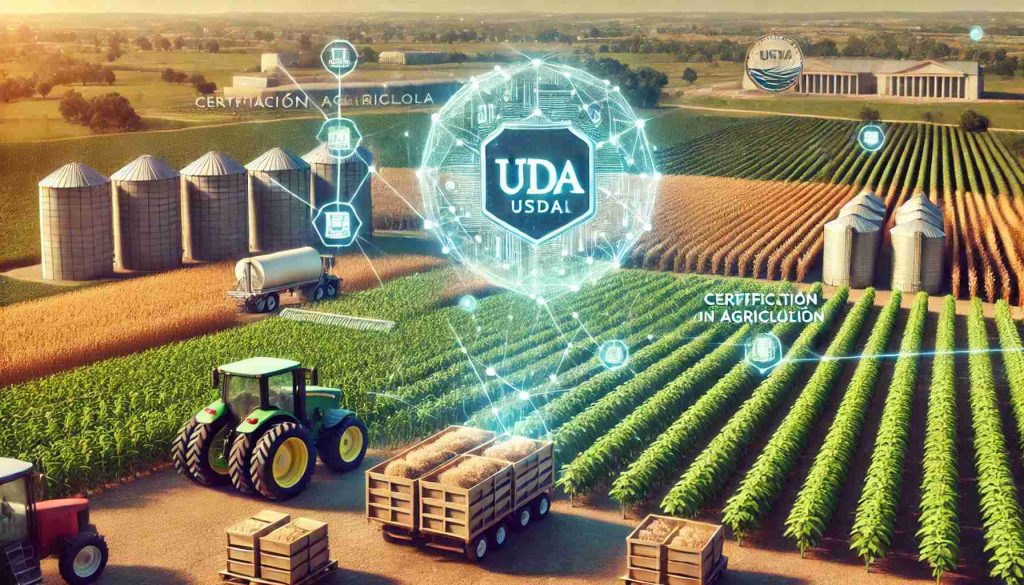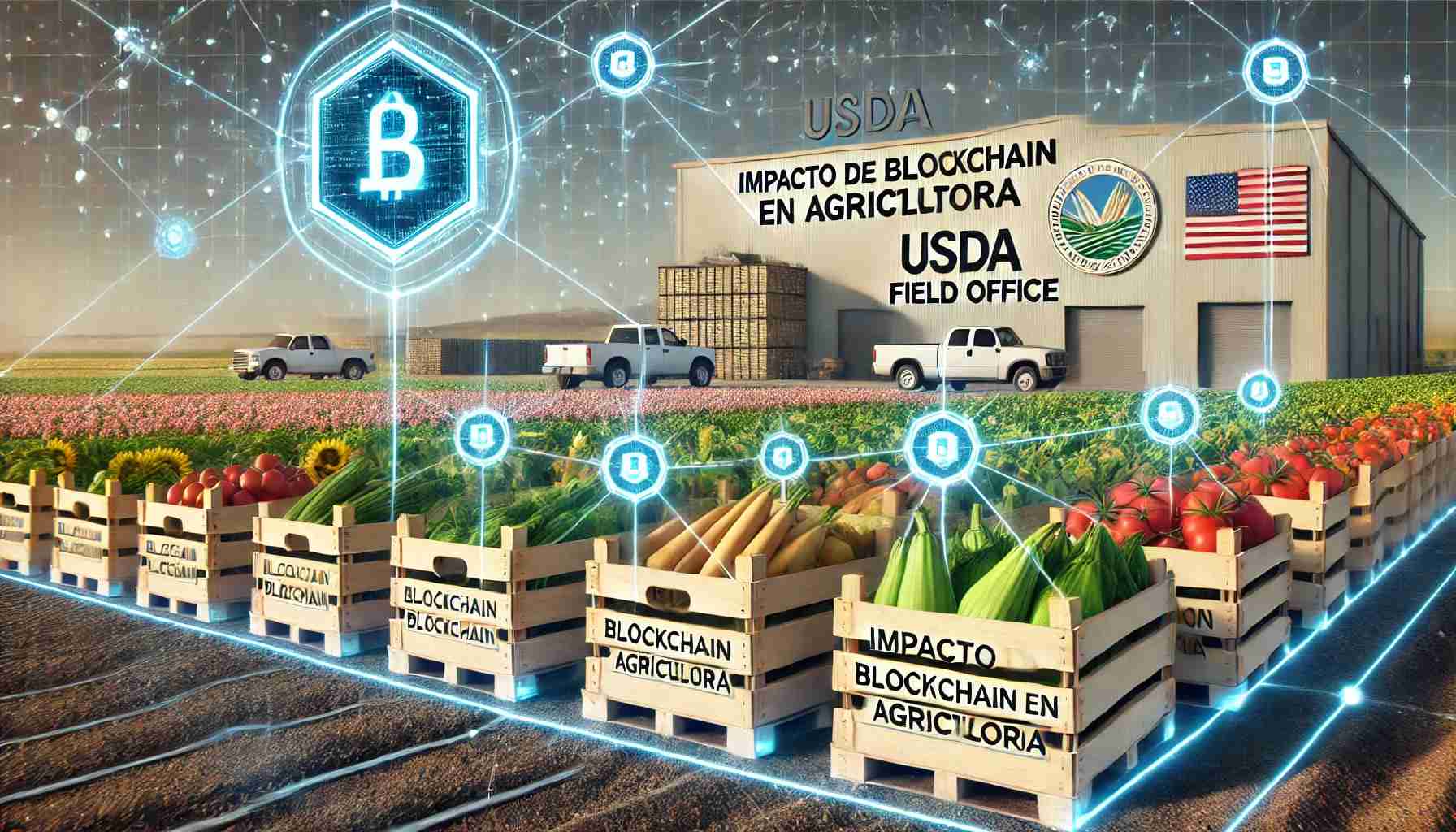Technological innovation continues to transform the most traditional sectors, and agriculture is no exception. In a move that marks a before and after in agricultural certification, the United States Department of Agriculture (USDA) has approved a certification system based on the blockchain technology. This initiative not only promises to improve the transparency and traceability in the industry, but could lay the foundations for an more reliable and efficient global agricultural system.
Blockchain in Agriculture: A New Paradigm
Blockchain technology has long been recognised for its ability to secure transactions and records in an immutable and transparent manner. Although popularised by cryptocurrencies, its applications have spread to a variety of sectors, and now, the agricultural industry is exploring its potential to improve certification processes and authenticity of agricultural products.
What is Blockchain and why is it relevant in agriculture?
Blockchain allows data to be recorded in a distributed and secure manner, forming a blockchain that ensures that information is transparent, immutable and accessible for network participants. In the case of agriculture, the blockchain can record every stage of the production cycle, from cultivation to distribution, resulting in a fully traceable and reliable certification system.
A Revolutionary Certification System: Key Advantages
The approval of the blockchain certification system by the USDA introduces a significant change for all players in the agricultural industry. Let's look at some of its key benefits:
- Full, Real-Time Traceability
One of the strengths of the blockchain is the ability to track agricultural products at every stage of the supply chain. With each step recorded on the blockchain, it is ensured that the complete history of a product is available and verifiable. This benefits both producers and consumers, by offering transparent information on origin and route of foodstuffs.
- More Efficient and Streamlined Certification Processes
Traditional certification methods often involve lengthy manual review processes and paper documentation. Thanks to blockchain, many of these processes can be automated through smart contracts, reducing the time and costs associated with certification.
- Increased Confidence and Security in the Supply Chain
Blockchain allows certifications and compliance records to be stored immutably, reducing the risk of fraud and increasing confidence in the authenticity of products. Consumers and retailers can trust that the certification reflects the actual data, and that it has not been tampered with.
- Instant Access to Certification Information
The blockchain allows authorised participants to access certification information in real time. This is a great advantage for inspectors, auditors and regulatorsThe Commission's new "Compliance Checkers", which can verify compliance without relying on physical documents or centralised databases, have been developed.
A Technology that Impacts the Entire Agricultural Value Chain
The implementation of a blockchain-based certification system has positive repercussions for everyone involved in the agricultural process, from the producer to the consumer.
- FarmersThey can easily demonstrate compliance with standards and regulations, benefiting from a faster and less costly certification process. This allows them to competing in international markets with greater transparency and security.
- ConsumersThey have access to detailed and reliable information on the origin and quality of the agricultural products they consume, which improves confidence and allows them to make informed decisions. more informed purchasing decisions.
- Distributors and retailersThe supply chain becomes more transparent, enabling more efficient logistics and reducing food waste.
- RegulatorsLike the USDA, they can track products more efficiently and verify compliance quickly and accurately.
Overcoming Challenges: Regulation and Collaboration
The implementation of blockchain in agricultural certification comes with some challenges. However, the evolution of the regulation and public-private partnerships are paving the way for smoother adoption.
Regulatory Developments and Favourable Regulations
The USDA is at the forefront of this change by developing a regulatory framework that encourage the adoption of blockchain without compromising data security and privacy. Other countries are beginning to explore similar regulations, suggesting that the future of agricultural certification may be shaped by global standards based on blockchain.
Integration with Existing Systems
The integration process is undoubtedly a challenge, but blockchain technology offers the advantage of being highly adaptable. Hybrid solutions are enabling companies to integrate blockchain with their existing management and traceability systems, facilitating gradual and affordable adoption for companies of all sizes.
Adoption Training and Capacity Building
The training of workers and companies in the agricultural sector is key to making the most of this technology. In this respect, events such as the World Token Congress offer a platform for entrepreneurs, farmers and regulators to hear use cases, learn from experts and discover how blockchain can be effectively integrated into their operations.
The Future of Agricultural Certification: Towards a Global and Sustainable System
The USDA's decision to implement blockchain in agricultural certification could set the stage for radical change in the industry globally. The next steps towards the expansion of this system include:
- Expansion to New CertificationsIn time, the system could be adapted to cover fair trade, organic, sustainability and other certifications.
- International Adoption and Global StandardsAs other countries and international organisations recognise the value of blockchain, they could join this initiative, creating a unified, global agricultural certification system.
- Continuous Innovation and New TechnologiesBlockchain is just the beginning. Combined with technologies such as artificial intelligence and the Internet of Things (IoT), it has the potential to further transform the agricultural supply chain.
Conclusion: A Step Towards Transparency and Sustainability in Agriculture
The USDA's implementation of blockchain in agricultural certification is a step towards a more secure future. transparent, efficient and safe in the food industry. This technology promises to address key challenges in agricultural certification and can create a more reliable and sustainable production and consumption system.
With the commitment and collaboration of all actors in the sector, this breakthrough could be remembered as the moment when agriculture embraced digital transformation to benefit consumers, producers and regulators alike.


